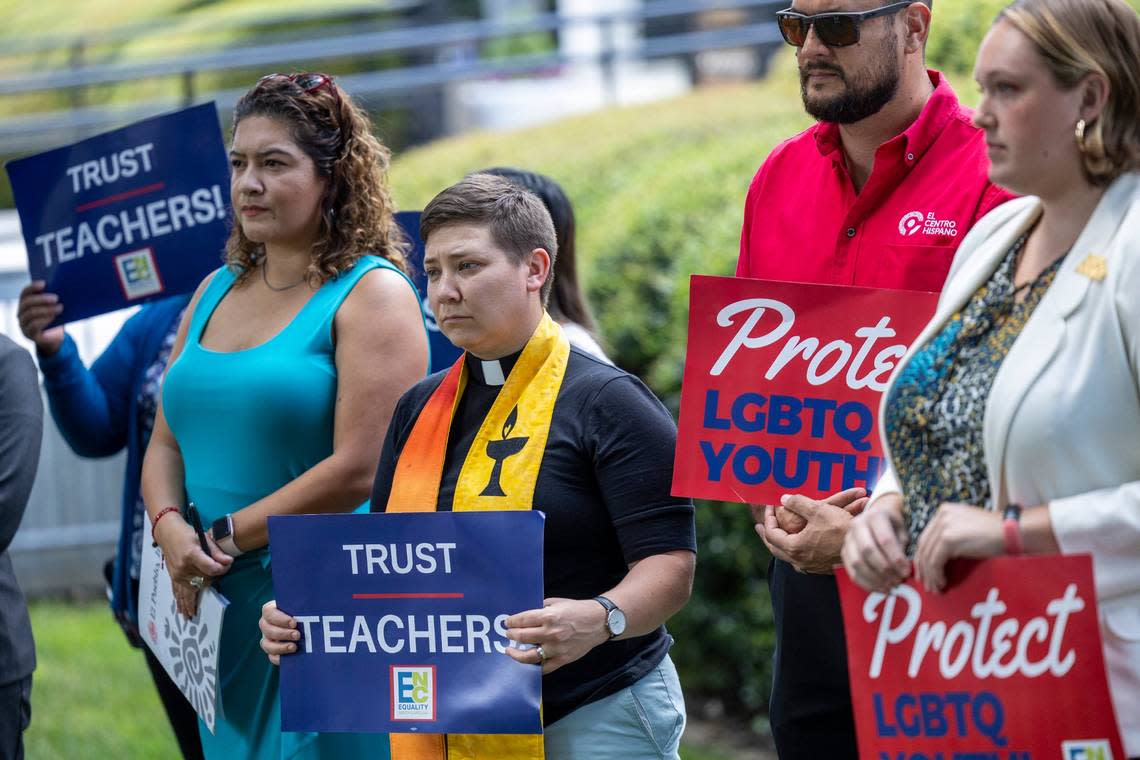Federal complaint accuses NC Parents’ Bill of Rights of anti-LGBTQ discrimination
An LGBTQ advocacy group filed a federal Title IX complaint on Tuesday accusing North Carolina of discrimination by passing the Parents’ Bill of Rights and a law barring female transgender athletes from playing on girls’ teams.
The Asheville-based Campaign for Southern Equality says both laws are creating a hostile environment for LGBTQ+ students that violates their federal rights. The group wants the U.S. Department of Education and the U.S. Department of Justice to intervene.
The “Parents’ Bill of Rights” requires public schools to notify parents if their child changes their name or pronoun. It also bans instruction in the curriculum on sexuality, sexual activity or gender identity in kindergarten through fourth-grade classrooms .
The “Fairness in Women’s Sports Act” says girls’ sports teams in middle schools, high schools and colleges “shall not be open to students of the male sex.”

“The state’s public education system is now clouded by fear, discrimination, and censorship that interferes with students’ ability to learn,” Craig White, supportive schools director for the Campaign for Southern Equality, said in a news release. “It is time for school districts to stop implementing S.B. 49 (Parents’ Bill of Rights) — because the anti-LGBTQ+ policies that this law requires are patently incompatible with the Title IX protections to which every LGBTQ+ student is entitled.”
Stopping ‘indoctrination’ of children
Both laws were backed mainly by Republican lawmakers and conservative groups who accused schools of promoting an LGBTQ agenda. Democratic Gov. Roy Cooper vetoed both bills but lawmakers overrode him in August.
“The only group that’s being marginalized is parents, and the Parents’ Bill of Rights was enacted to stop activists from secretly transitioning children, while keeping their parents in the dark,” Tami Fitzgerald, executive director of the N.C. Values Coalition, said in a statement Tuesday. “This lawsuit is a publicity stunt by activists who are intent on indoctrinating children as young as five with confusing messages about sex and hiding it from their parents. These are grooming tactics that put children and families in danger.
“Title IX was passed by Congress to give women opportunities in sports and education, not to advance the transgender agenda.”
LGBTQ students outed by law
The Campaign for Southern Equality reached out to students, parents, school board members and school employees across the state asking them to provide statements about the impact of the two new laws.
Several students talked about how the laws have led to LGBTQ students being outed to unsympathetic parents. The group redacted the names of the people who provided statements for the complaint.
“This new ‘Parents’ Bill of Rights’ has made it mandatory for my teachers to tell my parents the fact that I use a different name and pronouns,” a transgender high school student said in the complaint. “My parents disapproved, of course, and it was a fight for me to be able to be who I am in a place that I’m in almost every day.”
Some complainants said that schools are removing LGBTQ books. An elementary school media coordinator said their district had quit its partnership with the public library system because of concerns students could check out books that go against the new law.
Schools react to new state law
School districts have reacted to the Parents’ Bill of Rights in different ways.
The Chapel Hill-Carrboro school board recently voted not to follow the parts of the law it felt were anti-LGBTQ, the News & Observer previously reported.
The Johnston County school board expanded the law to include books in elementary school libraries and to cover fifth-grade classes, the N&O previously reported.
Charlotte-Mecklenburg Superintendent Crystal Hill removed three books — “Jack of Hearts (and other parts), “Let’s Talk About Sex” and “Red: A Crayon’s Story” — because of concerns they violated the new law and/or were too explicit.
“These actions from the Superintendent clearly tell staff and students that they do not matter, nor does the known harm foisted upon them by anti-LGBTQIA sentiment, legislation and hateful actions of a loud, but tiny minority,” a CMS elementary school parent said in the complaint.
Federal action sought against state
In June 2020, the U.S. Supreme Court ruled in the Bostock v. Clayton County case that federal employment discrimination law applies to transgender people.
Based on the court ruling, the Biden administration issued federal guidance saying Title IX’s prohibition of sexual discrimination in institutions receiving federal education funding includes discrimination based on sexual orientation and gender identity.
The Campaign for Southern Equality wants federal officials to take several “remedial actions,” including:
▪ The U.S. Department of Education and/or Department of Justice should issue a determination to the State Board of Education and state Department of Public Instruction that provisions of both laws violate Title IX.
▪ The state board and DPI “must convey this determination of their Title IX responsibilities to each of North Carolina’s 115 public school districts and over 200 public charter schools, provide training to school districts’ and charter schools’ Title IX coordinators on the legal protections afforded to LGBTQ students, and take steps to ensure compliance with the law.”
▪ The federal executive branch should request that the state board and DPI appoint a liaison to oversee and coordinate statewide compliance with Title IX.
▪ The state board and DPI should encourage all public school systems to adopt the measures recommended by the U.S. Department of Education for supporting gender non-conforming students
